Last updated on October 20th, 2024 at 12:08 pm
The Most Important Gods of The Greek Pantheon
![Greek Gods and their ancestors [infographic] Greek Gods and their ancestors [infographic]](https://atcorfu.com/wp-content/uploads/2021/10/pantheon-of-olympian-greek-gods.jpg)
The Twelve Olympian Gods are the most significant deities in Greek mythology, ruling from their divine abode on Mount Olympus.
They represent a range of aspects of life, nature, and human experience, and their stories form the foundation of ancient Greek religion and culture.
These gods were worshiped widely across Greece and beyond, with each deity having a unique role in both mythological tales and daily life.
While they lived in a mythical realm, their interactions with mortals, heroes, and each other created a rich tapestry of stories that explained the world and taught moral lessons.
Mount Olympus, located in Thessaly, was believed to be their home, an otherworldly place high above the mortal realm.
Despite their divine nature, these gods had human-like personalities, with their own strengths, flaws, and emotions.
They were not distant, unreachable deities; rather, they were directly involved in the affairs of the world and often exhibited behaviors and emotions similar to those of humans, such as jealousy, love, and anger. This dual nature made them both powerful and relatable, allowing ancient Greeks to see them as both guardians and sources of conflict.
Now, let’s explore each of the 12 Olympian gods in detail:
Dias (Zeus)
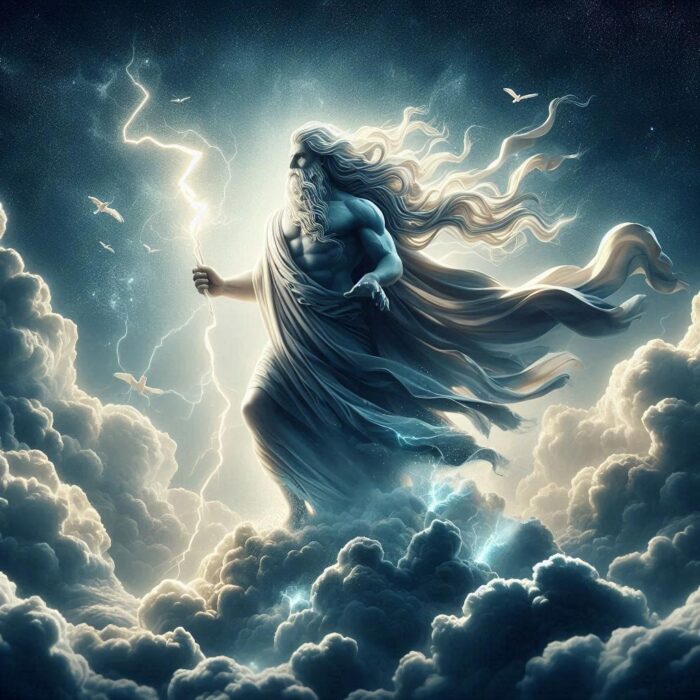
Dias, the king of the gods and ruler of Mount Olympus, presided over the sky and thunder, wielding his powerful thunderbolt to enforce his will. As the supreme deity, he maintained order among both gods and mortals, ensuring balance and justice in the cosmos. His role as a protector made him a patron of kings and leaders, often intervening in mortal affairs to set things right or to punish those who overstepped their bounds.
His status as the ultimate authority among the gods came from his victory over the Titans, particularly after he led his siblings in a successful rebellion against their father, Kronos. Zeus’s domain extended beyond just governance; he was also deeply associated with hospitality and oaths, as well as being the guardian of guests and strangers.
Despite his role as a figure of justice, Zeus’s numerous romantic entanglements were a source of contention, often causing strife among both gods and humans. His relationships resulted in the birth of many demi-gods and heroes, including Perseus and Heracles, whose stories intertwine with the broader tapestry of Greek mythology. These affairs often put him at odds with his wife, Hera, leading to many legendary conflicts.
Hera
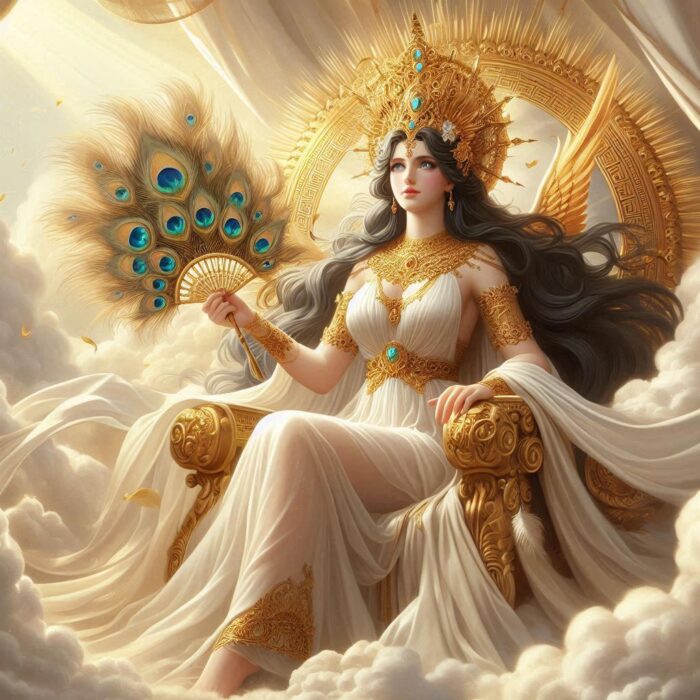
Hera, the sister and wife of Dias, reigned as the queen of the gods. She was the goddess of marriage, family, and childbirth, serving as a guardian of the sanctity of married life and a symbol of maternal care. Unlike other deities, whose domains included the unpredictable aspects of nature, Hera’s power was more focused on the orderly and traditional aspects of life. She held immense influence over the domestic sphere and was a protector of women during childbirth.
However, her marriage to Dias was fraught with turmoil due to his infidelities, which brought out her fiercely jealous nature. Hera’s wrath towards Zeus’s lovers and their offspring became the theme of many myths. For instance, she was relentless in her persecution of Heracles, even sending serpents to kill him as a baby and causing him numerous trials throughout his life.
Despite her stern and vengeful aspects, Hera was revered by the Greeks as a powerful deity who watched over families and upheld social order. In various cities, such as Argos and Samos, her temples were centers of worship, reflecting her status as a major deity within the pantheon.
Poseidon
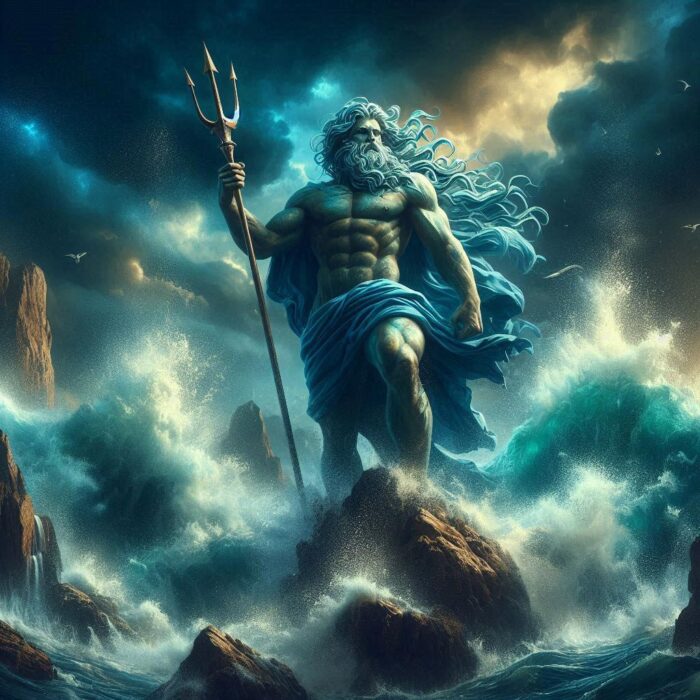
Poseidon, the god of the sea, earthquakes, and horses, was one of the most formidable and unpredictable of the Olympian deities. As the ruler of all waters, he commanded the oceans, seas, rivers, and lakes, wielding his trident to create storms, calm waters, or even cause devastating earthquakes. The Greeks saw Poseidon’s temperament as reflective of the sea itself—sometimes calm and generous, other times violently destructive.
He was both a provider, ensuring safe passage for sailors and abundant fishing, and a punisher, bringing shipwrecks and disasters upon those who displeased him. Poseidon’s influence also extended to land, where he was considered the creator of horses, often depicted alongside these noble animals. He was known to contest other gods for dominion over regions, such as his famous rivalry with Athena over the city of Athens, which he lost after offering the Athenians a saltwater spring while she provided the olive tree.
In mythological narratives, Poseidon played a critical role, such as in the Odyssey, where his wrathful pursuit of Odysseus turned a journey home into a decade-long ordeal. Though his temperament could be volatile, Poseidon was highly respected and feared by those who depended on the sea for their livelihoods.
Dimitra (Demeter)

Demeter, the goddess of agriculture, fertility, and the harvest, was central to the survival and prosperity of ancient Greek society. She governed the growth of crops, the fertility of the land, and the cycles of the seasons, making her a key figure in the rhythms of life. Wheat, barley, and corn were her symbols, embodying the agricultural abundance she bestowed upon the earth.
Her connection to the life cycle was embodied in the myth of her daughter Persephone, whose abduction by Hades brought about the changing seasons. Demeter’s grief during Persephone’s time in the underworld caused the earth to become barren, leading to winter, while her joy at her daughter’s return brought forth spring and renewal. This myth, central to the Eleusinian Mysteries, a major religious cult in ancient Greece, emphasized the themes of death and rebirth, and offered initiates promises of a better afterlife.
Demeter’s presence was also tied to rituals of life, death, and fertility, and her worship included sacrifices and ceremonies meant to ensure good harvests and protect against famine. As a motherly figure, she was both nurturing and formidable, embodying the life-sustaining power of the earth and its ability to give and take life.
Athena
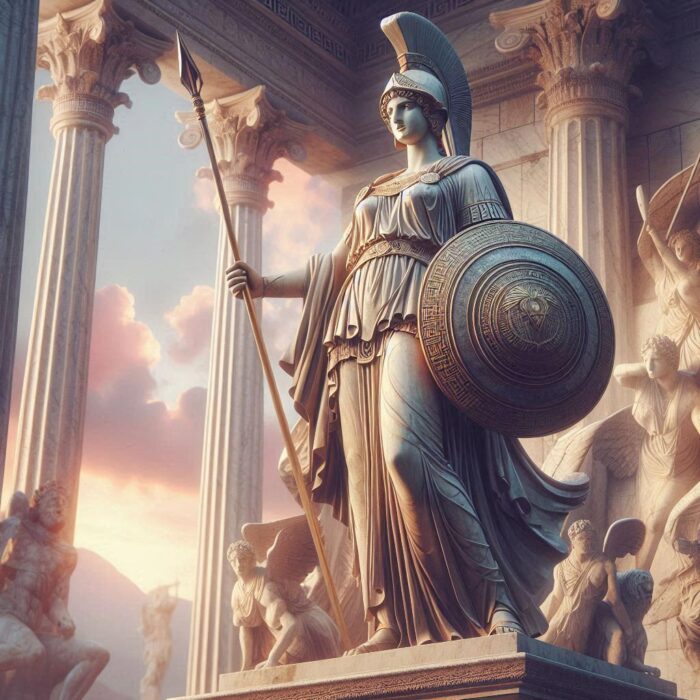
Athena, the goddess of wisdom, warfare, and crafts, was born fully armed from the head of Zeus, symbolizing her role as a deity of intellect and strategic warfare. Unlike her brother Ares, who represented the brutal and chaotic side of war, Athena was known for her tactical acumen, guiding heroes like Odysseus, Perseus, and Heracles to victory through cleverness and strategy.
She was also the patron goddess of Athens, named in her honor after winning a contest against Poseidon. Athena’s wisdom extended beyond the battlefield; she was a goddess of crafts, such as weaving, and a symbol of civilization, law, and justice. Often depicted with an owl and wearing a helmet, she embodied the ideal of rational thought and leadership, making her a favored deity among philosophers and statesmen.
Despite her martial prowess, Athena was also a virgin goddess, representing purity and self-discipline. Her role as a protector of cities and heroes cemented her as one of the most respected and revered figures in Greek mythology, known for her calm demeanor and impartial nature in matters of justice and war.
Apollon (Apollo)
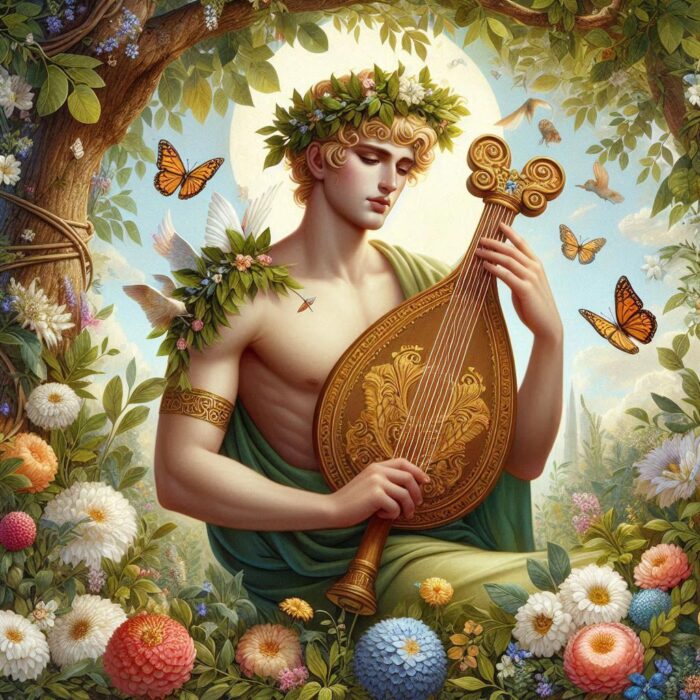
Apollo, the god of the sun, music, poetry, prophecy, and healing, was one of the most versatile and revered deities in the Greek pantheon. As the son of Zeus and Leto, and the twin brother of Artemis, Apollo was often depicted as a youthful and radiant figure, symbolizing beauty and harmony. He rode his chariot across the sky each day, bringing light and warmth to the world, but his influence extended far beyond that of a solar deity.
Apollo was known for his mastery of the lyre, which he used to inspire both gods and mortals with music and poetry. He was also the god of prophecy, with his most famous oracle located at Delphi, where priests and priestesses interpreted his cryptic messages. These oracles played a significant role in guiding the decisions of individuals and city-states, making Apollo a god of wisdom and foresight.
His dual nature as a healer and bringer of plague highlighted his power over life and death. While he could cure diseases and bring relief through his knowledge of medicine, he could also unleash devastating plagues with his arrows. Apollo’s complexity and cultural significance made him a central figure in many myths, ranging from his tragic love affairs, like that with the nymph Daphne, to his role as a divine protector of Troy during the Trojan War.
Artemis
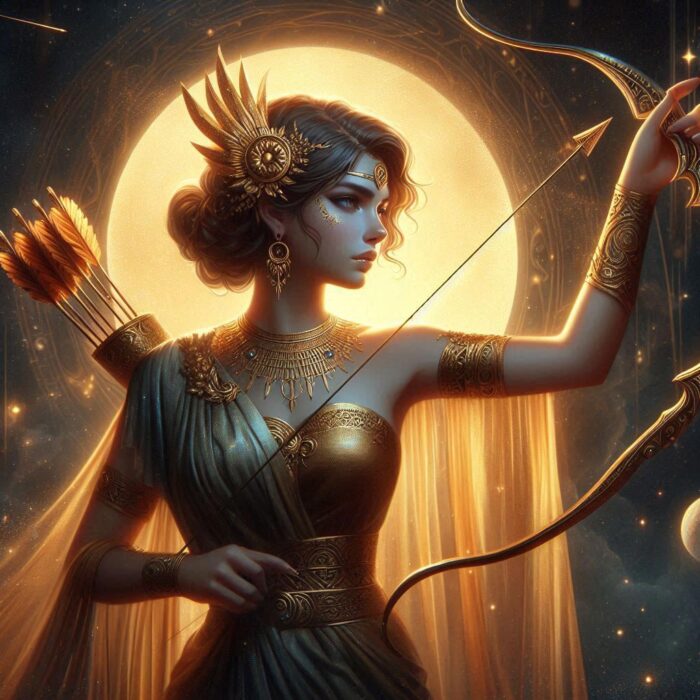
Artemis, Apollo’s twin sister, was the goddess of the hunt, wilderness, and childbirth, as well as a protector of young women. She roamed the forests and mountains with her band of nymphs, wielding her silver bow and arrows with unmatched skill. Artemis was often depicted as a virgin huntress, fiercely independent and unwilling to be tied down, representing the untamed and free aspects of nature.
As a protector of animals and nature, Artemis held sway over wild creatures and the moon, guiding hunters and ensuring balance in the natural world. She was also associated with childbirth and the safety of women during labor, highlighting her role as a nurturing yet fierce guardian. This duality made her both a goddess of life, safeguarding the young and the vulnerable, and a bringer of swift retribution to those who defied her or threatened her purity.
Her myths frequently revolve around her punishing mortals who overstepped their boundaries, such as the hunter Actaeon, who was transformed into a stag for spying on her during a bath. Artemis’s worship was especially popular in rural areas, where people sought her blessings for successful hunts and protection against the dangers of the wilderness.
Ares
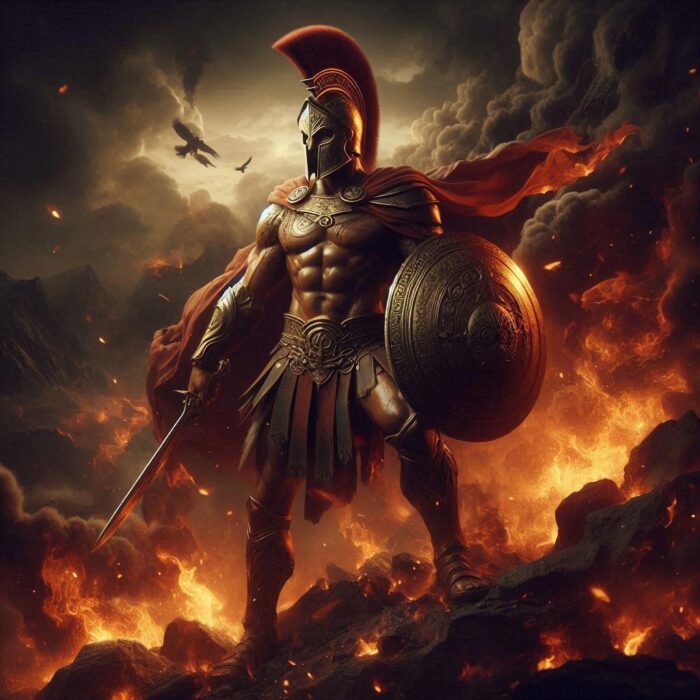
Ares, the god of war, embodied the brutal, chaotic, and bloodthirsty aspects of battle. Unlike his sister Athena, who represented strategy and wisdom in warfare, Ares thrived in the raw and violent nature of combat. He was often depicted as a fearsome warrior, charging into battle with a spear and shield, stirring up chaos wherever he went. His presence on the battlefield was known to inspire fear and fury among soldiers, making him a feared yet respected deity.
Despite his power, Ares lacked the favor of the other gods, including his father Zeus, who often viewed him as reckless and destructive. This made him an outsider among the Olympians, with few temples dedicated to his worship compared to other gods. His love affair with Aphrodite, the goddess of love, added a layer of complexity to his character, blending the seemingly incompatible forces of love and war.
In mythology, Ares often faced defeat, such as when he was captured by two giants or wounded during the Trojan War. Yet, he represented an essential force in the Greek understanding of war—a reminder of the uncontrollable and destructive power that could arise in human nature during times of conflict.
Aphrodite

Aphrodite, the goddess of love, beauty, and desire, wielded an irresistible power that could enchant gods and mortals alike. Born from the sea foam near Cyprus, she personified the allure of physical beauty and the mysteries of attraction. Aphrodite’s influence extended beyond mere romantic love; she governed all aspects of passion, whether in marriage, seduction, or the more chaotic and illicit realms of desire.
Her beauty made her a central figure in many myths, such as the story of the Trojan War, where she awarded the golden apple of beauty to herself, thereby sparking the legendary conflict. As the wife of Hephaestus, she had a tumultuous relationship, being unfaithful with Ares, among others. This aspect of her character often led to conflicts among the gods, as her affairs and schemes brought about jealousy and rivalry.
Yet, Aphrodite was also a benefactor of those in love, granting her blessings to unions and fostering harmony in relationships. She held sway over the finer things in life, such as art, music, and sensual pleasures, embodying the power of attraction that binds the universe together. Her worship was widespread, with temples and festivals dedicated to her across the Greek world, where she was celebrated as a force of life’s pleasures and creative energy.
Hephaestos (not U in Greek, we are not Romans)
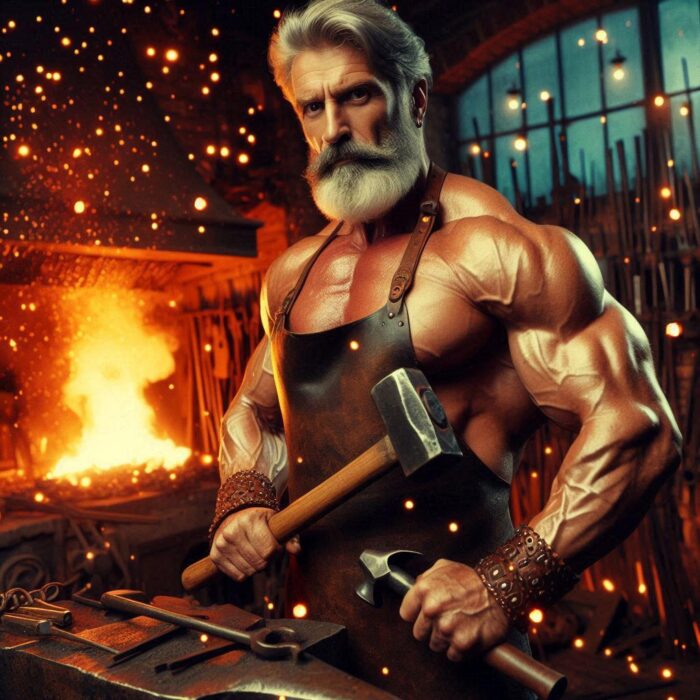
Hephaestus, the god of fire, metalworking, and craftsmanship, was the divine smith who forged weapons, tools, and magnificent works of art for the gods. Despite his physical deformity—being lame from birth or after being cast down from Olympus by Hera or Zeus—Hephaestus’s skill with hammer and anvil was unmatched. He created Zeus’s thunderbolts, Achilles’ armor, and the chains that bound Prometheus, highlighting his central role in the divine order.
His workshop, located beneath volcanoes, symbolized the powerful yet dangerous nature of fire, and he was often accompanied by the Cyclopes, who assisted him in his creations. Hephaestus’s marriage to Aphrodite, though filled with infidelity, showcased a contrast between the beauty of the goddess and the rugged appearance of the craftsman, embodying the complex interplay of art and nature.
Though not as outwardly majestic as other Olympians, Hephaestus was respected for his mastery over the transformative power of fire, which could both destroy and create. His role as a patron of artisans and laborers made him a relatable and revered figure, especially among those who worked with their hands to shape the world around them.
Hermes
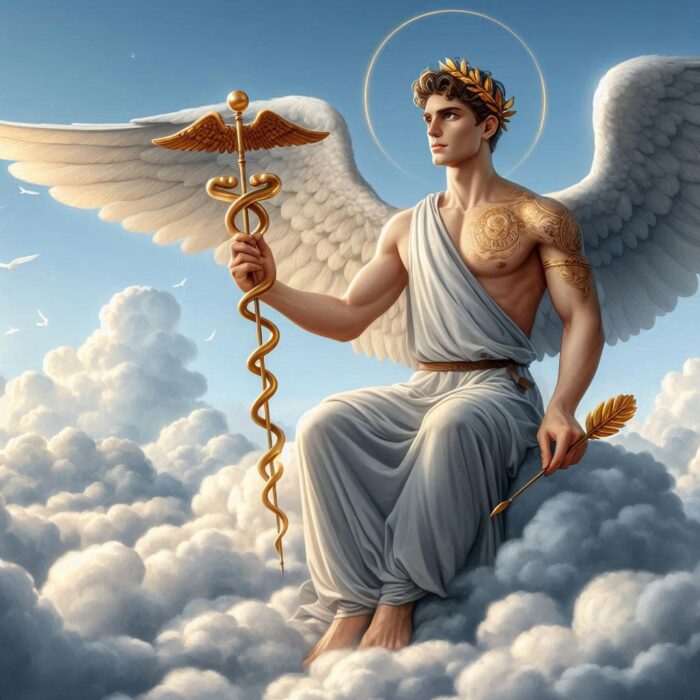
Hermes, the fleet-footed messenger of the gods, presided over communication, commerce, and travel, making him one of the most dynamic and versatile deities. With his winged sandals and caduceus, Hermes moved effortlessly between the realms of gods and mortals, guiding souls to the underworld and carrying messages between Olympus and the human world. As a protector of travelers and merchants, he was associated with trade, luck, and the intricate art of persuasion.
Hermes was also a trickster, known for his cunning and resourcefulness, as seen in the myth where he stole Apollo’s cattle as a child, only to cleverly negotiate his way out of trouble. This aspect of his personality made him a deity of thieves and those who lived by their wits, offering his blessings to those who could navigate the uncertainties of life with skill.
Despite his mischievous nature, Hermes was a helpful and benevolent figure, often aiding heroes like Odysseus and Perseus on their quests. His role as a psychopomp, guiding the souls of the dead, also tied him to the more solemn aspects of life and death, making him a vital intermediary between different worlds.
Hestia
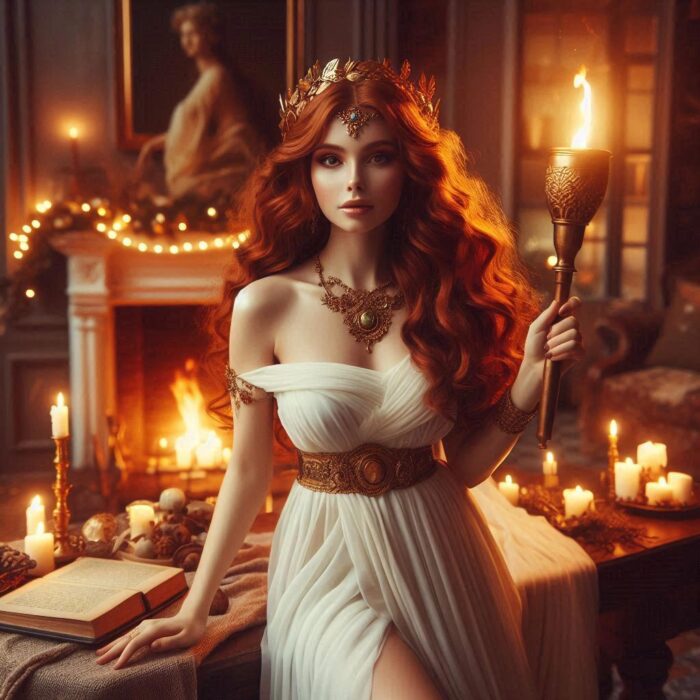
Hestia, the goddess of the hearth, home, and domesticity, held a unique place among the Olympian deities. Though she stepped down from her throne in favor of Dionysus to maintain the number of Olympians at twelve, Hestia remained one of the most revered figures in Greek religion. As the keeper of the sacred flame, she represented the stability and warmth of the household, embodying the spirit of the home and communal harmony.
Hestia’s presence was felt in every Greek household, where a portion of every meal was offered to her as a symbol of hospitality and reverence. Unlike other deities who sought adventure and influence beyond their realms, Hestia’s focus was on maintaining peace and continuity within the home. Her decision to remain a virgin goddess, like Athena and Artemis, further emphasized her role as a nurturing yet independent presence.
Though she lacked the dramatic stories of other gods, Hestia’s quiet influence was central to the well-being of families and the state, making her a stabilizing force in both private and public life. Her ever-burning flame served as a reminder of the unity and warmth that the hearth brought to Greek society.
Dionysos
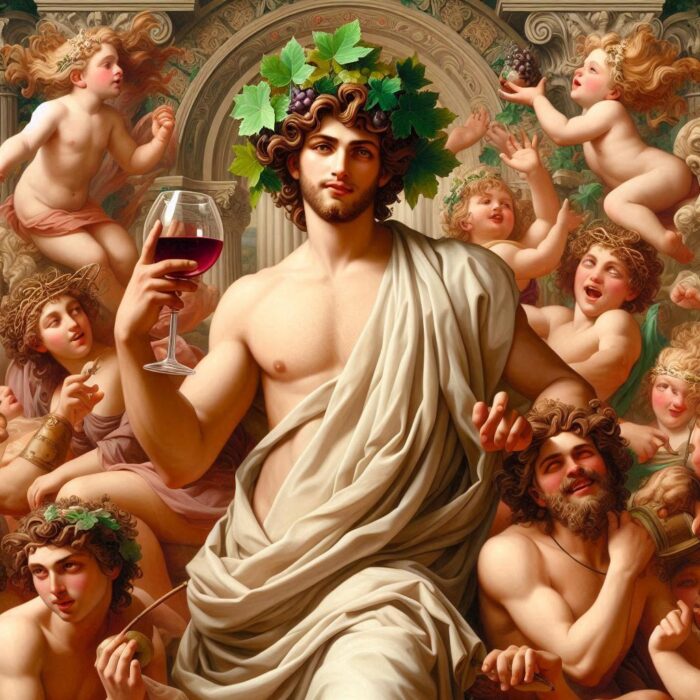
Dionysus, the god of wine, ecstasy, and revelry, represented the liberating forces of nature and the transformative power of intoxication. Born from Zeus and the mortal Semele, Dionysus was both a god of the divine and the earthly, symbolizing the blurred boundaries between the civilized world and wild, untamed nature. He traveled far and wide, spreading the knowledge of viticulture and the mysteries of wine, which could inspire joy, madness, and a sense of divine connection.
Dionysus’s rites, known as the Dionysian Mysteries, involved ecstatic celebrations that allowed participants to break free from societal norms and experience a deeper communion with the divine. This made him a god of both creative inspiration and chaotic frenzy, as he could bring forth visions and madness in equal measure.
His followers, including satyrs and maenads, reflected the wild and ecstatic aspects of his character. Despite his association with chaos, Dionysus was also a god of rebirth and regeneration, as symbolized by the annual cycle of the grapevine. His dual nature made him a complex and multifaceted deity, embodying both the joy and danger that come with the loosening of human constraints.
Hades
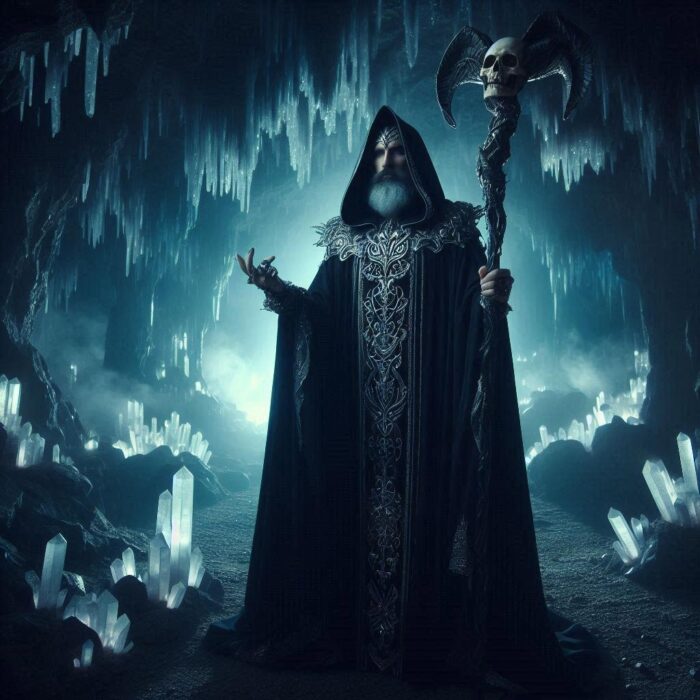
Hades, the God of the underworld, ruled over the realm of the dead with a stern but just demeanor, making him one of the most feared and misunderstood figures in Greek mythology. As the brother of Zeus and Poseidon, Hades shared dominion over the cosmos after the defeat of the Titans, but his lot was the underworld—a dark, shadowy realm far removed from the sunlight and splendor of Olympus. Although he held tremendous power over the souls of the deceased and the treasures hidden beneath the earth, Hades rarely left his domain, preferring the solitude of his dark kingdom.
His kingdom, often referred to simply as “Hades” or the “House of Hades,” was not just a place of torment but a complex afterlife with various regions for the souls of the departed. The River Styx formed a boundary between the world of the living and the dead, with Charon the ferryman transporting souls across its dark waters. Hades ruled alongside Persephone, his queen, whom he famously abducted from the world above—a myth that explained the changing seasons. Despite his grim role, Hades was not seen as inherently evil or malevolent; rather, he was a necessary and balanced counterpart to the cycle of life and death.
Hades also presided over the riches of the earth, earning him the title of “Plouton” or “Pluto,” meaning “the wealthy one.” This association with buried treasure and fertile soil reflected the dual nature of his domain—both a resting place for the dead and a source of new life through the earth’s bounty. Unlike the other gods, Hades had few temples or worshippers, as the Greeks were wary of invoking his name directly. Yet, he was respected as a god who maintained the natural order, ensuring that the dead found their place and that the boundaries between the realms of the living and the deceased remained intact.
These twelve deities were central to Greek religious practices, influencing everything from festivals to daily life. Each brought their own strengths and stories to the ancient mythological landscape, shaping the rich cultural tapestry of ancient Greece.
Note: All photos are created using AI, as we were unable to settle an interview with all the gods. We did try, but Zeus never answered the call, and the others seemed to be very busy. So, forgive us for presenting the fruits of AI. You’ll be seeing a lot of AI content in the future anyway, so don’t complain!
Read More from Greek Mythology
Ancient Goddesses: Powerful Women in Greek Mythology
The presence of Goddesses and powerful women in Greek mythology is vast; in fact, it is not inferior to that of men, and in many instances, it surpasses it.
The Olympic Games in Ancient Greece
The Olympic Games in ancient Greece were a major sporting and cultural event that took place every four years in Olympia, a sanctuary dedicated to the god Zeus.
Revealing Most Important Figures of Greek Mythology
Greek mythology is a rich tapestry of divine beings and stories, with each generation of gods possessing its own unique qualities, roles, and rulers.
The Most Famous Tales in Greek Mythology
Greek mythology tales aren’t just a collection of stories; it’s a cosmic symphony that’s been playing for centuries, and its timeless themes and characters will keep us under its spell for eons to come.
Great Heroes in Greek Mythology and Their Labours
Ancient Greek heroes were individuals who were believed to possess extraordinary abilities or qualities, and who performed great feats.
The 12 Labours of Hercules in Greek Mythology
Herakles (Hercules), performed twelve Labors to prove himself worthy of immortality, facing many monsters, villains, and challenges.







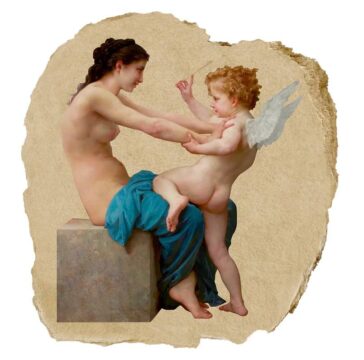



Comments